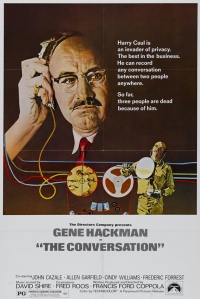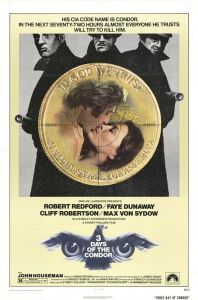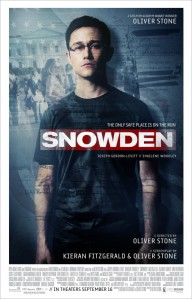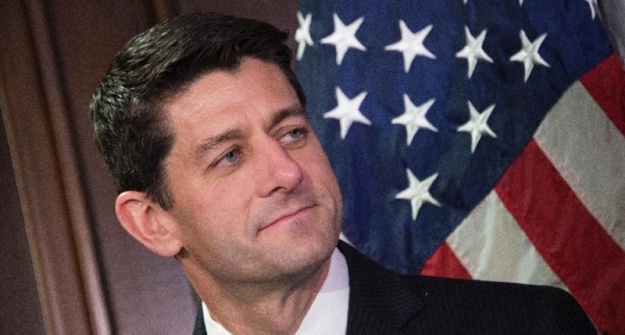



Paper prepared for presentation at the
2016 History Department Postgraduate Colloqium of the University of Reading
Reading, England, June 9, 2016
In June 1974 the Francis Ford Coppola-directed film The Conversation starring Gene Hackman was released. The two-hour long film portrayed the breakdown of surveillance expert Harry Caul, played by Hackman, who is described in the promotional tagline as ‘an invader of privacy’. Caul believed the couple he is spying on will be murdered by mysterious forces, which in turn cause Caul to question his actions. The mental collapse of Caul as he struggled with his moral compass asked the movie-goer whether what Caul was seeing was the truth or not. But the message was clear: individuals and agencies had the ability to intrude into the private lives of citizens without their knowledge.
Roll forward fifteen months to September 1975. wSydney Pollack’s film Three Days of the Condor starring Robert Redford and Max von Sydow hits the big screen. Redford plays Joseph Turner, an academic CIA researcher who avoids being assassinated along with his colleagues in New York. Turner goes on the run after the CIA suspects him of being a rogue agent. To add to the feeling that there is no place to hide the majority of the action takes place in broad daylight USA, mostly New York. Turner’s struggle was depicted to reflect that of the average American citizen with the hidden power of government agencies.
In addition to being to be highly praised by critics and a good watch, both of these films are indicative of the paranoia and distrust surrounding government intelligence agencies of the period, especially during the year 1975, the year of intelligence; a year described by former director of the CIA Robert Gates as ‘the worst year in CIA history.’[1] It was a year that saw a presidential commission and two congressional enquiries investigate the activities of the US intelligence agencies, with particular reference to their domestic operations. It was a year that saw some of the darkest secrets of the intelligence community laid bare to the world. And it was a year that illustrated the potential dangers of unchecked hidden power within a democratic society.
This paper will focus on the findings and revelations of one of those congressional enquiries: the US Senate Select Committee to study Governmental Operations with Respect to Intelligence Activities – mercifully shortened to the Church Committee after its chairman Senator Frank Church of Idaho. In comparison to the other two enquiries, the Church Committee was the most extensive and revealing. The Rockefeller Commission named after its chair Vice President Nelson Rockefeller, was deemed to be a presidential whitewash and an attempt to retain executive control of the intelligence community. The Pike Committee, the House of Representatives equivalent of the Church Committee, was excessively aggressive and had its final report quashed by the House. In comparison to the other enquiries the Church Committee was objective, thorough and put its findings in a final report measuring two volumes and five books. This paper, based on my research to date, will use the published Church Committee’s findings to illustrate the opportunities that were grasped by both the executive branch and the intelligence agencies to abuse their power during the Cold War. Furthermore, it will assist in understanding that such dangers are not restricted to a Cold War environment, but still exist and threaten the democratic principles of the United States and beyond today. Initially this paper will deal with the ‘why’ – why did the Church Committee come into existence? – Before the ‘what’ – what did it find in its investigation? What did it mean? What does it say to us today in the twenty first century?
The Church Committee was formed because of a combination of long term and immediate factors. The Watergate enquiries that had concluded the previous year had seen the distrust between Congress and the executive branch come to a head. The struggle for superiority between the two branches of government had not dispersed since President Richard Nixon’s resignation the previous year; furthermore Nixon’s pardon by his successor Gerald Ford had done nothing but exacerbate the situation.

New York Times, Dec 22, 1974
When Pulitzer-prize winning journalist Seymour Hersh’s article adorned the front page of the New York Times on December 22nd 1974 the White House moved quickly. The article claimed that the CIA had maintained surveillance on American anti-War protestors, an act that went against its 1947 founding charter. Ford ordered CIA Director William Colby to confirm or deny the allegations. To Ford’s horror Colby responded by presenting Ford with a 700 page document known as the ‘Family Jewels’ which detailed all of the legally-suspect activities the CIA had participated in its twenty seven year lifetime. Alarmed, Ford ordered a commission under the leadership of Vice President Nelson Rockefeller to investigate the claims of the Hersh article. The Commission’s objective was to not only ‘ascertain and evaluate any facts relating to activities conducted within the United States’[2] but also to stop Congress from seizing the initiative in the enquiry and ‘to preserve the CIA.’[3] While the Commission found that the CIA had ‘engaged in some activities that should be criticized and not be allowed to happen again’ it failed utterly in deterring Congress.[4]
The Church Committee was voted into existence on 27th January 1975, a month after the Hersh article. Calls for an investigation were urged ‘to cleanse whatever abuses there have been in the past.’[5] Senate Majority Leader Mike Mansfield stated that the select committee would be neither a ‘witch hunt nor whitewash’ and that ‘there will be no wholesale dismantling of our intelligence community.’[6] Where the Rockefeller Commission was restricted to just domestic CIA operations the Church Committee’s remit was wider, encompassing all intelligence agency activities since the Second World War. The investigations built on the work of the Rockefeller Commission and unearthed a number of operations that had been unconstitutional and illegal, and intruded on the private lives of its citizens. It judged such operations as ‘degrading a free society.’[7] While the Rockefeller Commission focussed solely on the accusations Hersh had made in his New York Times article, the Church Committee identified that US citizens’ civil liberties had been encroached upon by the CIA, the FBI and NSA in the quest to secure national security.
The CIA operation that had been illustrated in Hersh’s article was Operation CHAOS. This operation was an attempt by the CIA to connect the dissident anti-War movement to foreign organisations. It had been ordered to do by President Lyndon Johnson in 1967. Johnson was unable to understand that the anti-Vietnam war protestors were executing the most basic of American rights – the right to protest against the government. Instead Johnson suspected communist influence from overseas and ordered the FBI to investigate as early as 1965. When the Bureau failed to find such a connection Johnson turned to the CIA. While this was not strictly illegal, the Agency’s retention of files on the US citizens it had placed under surveillance was in opposition to its statutory regulations. According to the 1947 National Security Act the Agency was to have ‘no police, subpoena, law-enforcement powers or internal security functions.’[8] Yet the Agency’s investigations into the anti-War movement were just that.
As well as its domestic activities the Committee was highly critical of the Agency’s involvement in assassination plots of various foreign leaders. While the Committee found that the Agency had not actually assassinated anyone it had been supportive of plots to assassinate or overthrow leaders such as Fidel Castro of Cuba, Patrice Lumumba of the Congo, Ngo Dinh Diem of the Republic of Vietnam, and Rafael Trujillo of the Dominican Republic. The Committee stated that such plots violated ‘moral precepts fundamental to our way of life.’[9] Such was the clamour of the public to learn about these plots that the Committee was forced to publish an interim report solely on the matter.
The FBI’s activities were even more nefarious. Under the directorship of J Edgar Hoover the Bureau mounted a campaign between 1956 and 1972 against various protest and political groups. This came under the banner of what the Bureau termed COINTELPRO – a portmanteau of Counter Intelligence Program. The illegal surveillance and at times politically motivated programs were aimed at a wide range of targets. The COINTELPROs were deliberately ambiguously named to enable the Bureau to encompass individuals and organisations under each program. Target groups that were labelled by the Bureau as The New Left included Students for a Democratic Society and other student and anti-Vietnam War groups; the Black Panther Party and the Southern Christian Leadership Conference (SCLC) were included in the program COINTELPRO Black Hate/Black Nationalism. Anyone that publicly opposed government policy became targets of the various COINTELPRO programs: White Hate, Puerto Rican Independence Party, Socialist Workers Party, and the Communist Party of the United States. It’s important to note that none of the groups or individuals targeted by COINTELPRO was ever investigated with prosecution in mind. In the FBI’s own words the information was intentionally gathered ‘to expose, disrupt, misdirect, discredit or otherwise neutralise.’[10]
The information gathered from COINTELPRO was often used to the political advantage of the four presidential administrations of its lifetime. It was information harnessed through illegal wiretaps, warrantless surveillance, and through a Bureau operating beyond its remit. The Kennedy brothers only publicly pledged their support for the civil rights movement after finding that Martin Luther King had no communist affiliation. This reassurance was gained after using information gathered from warrantless-wire taps authorised by Attorney General Robert Kennedy. Lyndon Johnson – Kennedy’s successor – paranoid and fearing a coup in favour of arch rival Bobby Kennedy, used the FBI to perform illegal surveillance on rival candidates at the 1964 National Democratic Convention in Atlantic City; firstly so that he could identify his rivals, and secondly to ensure that he would win the nomination.
The National Security Agency (NSA) at the time was considered so secret that its existence was only rumoured about. During the Church Committee’s investigations its acronymic title was jokingly referred to by investigators as the No Such Agency despite being founded in 1952. Two of the Agency’s programs were of concern to the Church Committee – Project Minaret and Project Shamrock. These two projects were programs that intercepted electronic and telegraphic communication between the United States and overseas. Project Shamrock ran from 1956 to 1975 while Project Minaret ran between 1967 and 1973. Shamrock enabled the Agency to copy every telegram between the US and overseas with the collusion of three communications companies who had been assured that their efforts were helping to maintain national security. The NSA had no such charter or guidelines such as the FBI and NSA and so was not restricted in its activities involving domestic intelligence gathering. According to the testimony of NSA Director General Lew Allen to the Church Committee, those Americans whose communications were intercepted were part of a watch list. This watch list consisted of individuals suspected of criminal activity by various law enforcement agencies such as the FBI or the Bureau of Narcotics and Dangerous Drugs (BNDD), the forerunner of the Drug Enforcement Agency.
The Committee’s concerns were not with the data collected but with the process that the NSA had undertaken. At no point did the NSA seek or was given a warrant for the interceptions involving US citizens, which was a breach of their constitutional rights under the Fourth Amendment. At the time of the Church Committee the history of the Fourth Amendment was described as ‘the history of the American revolution and this nation’s quest for independence.’[11] Senator Church warned that the Agency’s technological ability meant that it ‘could be turned inward against our own people’ with little restriction.[12] The prescience of the Church Committee was uncanny: skip forward thirty eight years to 2013 and the revelations of former CIA and NSA employee Edward Snowden mirror that of the Church Committee. In place of the Project Shamrock there is the NSA’s PRISM, part of a global surveillance scheme. The Congress-approved PRISM program originated in the presidency of George W Bush and continues to this day. The NSA is authorized to access the electronic communications of US citizens for up seven days without the necessity of a warrant or referral to the courts. Barack Obama defended the program when it was revealed to the world through the Washington Post and Guardian newspapers. The President erroneously described PRISM as a ‘circumscribed, narrow system directed at us being able to protect our people. And all of it is done under the oversight of the courts.’ And, like his predecessors, described the surveillance undertaken solely ‘for legitimate national security purposes.’[13] As Chancellor Merkel discovered when it was revealed the NSA had collected data from her telephone calls, there are no such restrictions on the NSA acquiring intelligence on overseas targets.
The Church Committee believed that the dangers that accompanied the operation of intelligence agencies in a democratic society could be overcome. The danger is not the intelligence agencies themselves but the secrecy that surrounds them. In the words of one US Senator in 1975 ‘the very nature of these intelligence agencies is in direct contradiction to the concept of a free society.’[14] The Church Committee felt that the solution to the problems lay in robust congressional oversight of the intelligence community. Prior to the Committee’s investigations the intelligence community had been answerable to four different committees although rarely and usually with little enthusiasm. Congress had taken the opinion that the intelligence community was run by honourable men, and as far as Congress was concerned the less they knew the better. In the words of one politician ‘Congress didn’t know, nor did it want to know.’[15] But such a lack of vigilance had led to the abuse of the constitutional rights of US citizens by the US intelligence community, sometimes at the direction of the White House. Such an abuse was possible ‘primarily because the checks and balances of designed by the Framers of the Constitution to ensure accountability had not been applied.’[16]
In its summary the Church Committee recommended that the Senate create a Permanent Select Committee on Intelligence (SSCI) to ensure that such opportunities never arose again. However, despite the SSCI being established in 1976, the Snowden revelations are evidence that the oversight has neither been robust nor effective. In addition to the Snowden revelations it emerged that the CIA, ‘encouraged by political leaders and the public to do whatever it could’ in the wake of the 9/11 attacks, adopted ‘a program of indefinite secret detention and the use of brutal interrogation techniques in violation of US law.’[17] Senator Dianne Feinstein, chairman of the SSCI 2009 to 2015, stated that such activities were evidence that the United States and the SSCI had allowed ‘grievous past mistakes to be repeated.’[18] Once again, Congress didn’t know, nor did it want to know.
Just like the 1970s film-makers, concerns of the intelligence community in the modern era are evident in twenty-first century movies. CIA torture in so-called black sites was depicted in Kathryn Bigelow’s 2012 feature film Zero Dark Thirty. The film which depicted the CIA’s hunt for Osama Bin Laden neither justifies nor condemns the torture apart from – strangely – its effect on the CIA agents. In addition this year’s release from erstwhile conspiracy theorist Oliver Stone entitled Snowden is sure to cast a critical eye on the US government’s treatment of the intelligence community whistleblower.
What is evident is the failure of Congress and the nation to learn from the Church Committee’s findings. The US media has given more airtime and paper space to the pseudo-celebrity status of Edward Snowden than to the crimes he has publicised. The press, Congress and the people all agree that there is a necessity for an intelligence service, but what needs to be established and vigorously enforced are the parameters in which they can operate within a democratic state. This requires the watchfulness of Congress and a vigilant citizenry willing to question its government. Failure to do could result in the liberties of the nation being encroached upon yet again, if they have not been already.
[1] Robert M Gates, From the Shadows, (New York: 1996) p60
[2] Commission on CIA Activities within the United States, Report to the President, (Washington: 1975), p271 [Afterwards cited as the Rockefeller Report]
[3] Memorandum of Conversation: Allegations of CIA Domestic Activities, , January 3rd, 1975, Gerald Ford Library.
[4] Rockefeller Report p10
[5] Senator John Pastore, Congressional Record, January 21, 1975, p840
[6] Congressional Record, January 21st 1975, p843
[7] United States Senate, Select Committee to Study Governmental Operations with Respect to Intelligence Activities, Final Report together with additional, supplemental, and separate views, (S.Rpt. 94-755) [Hereafter referred to as Church Report] ‘Book II. Intelligence Activities and the Rights of Americans’ (Washington: April 26, 1976) p10
[8] 1947 National Security Act, Sec 102, (d), (3)
[9] United States Senate, Select Committee to Study Governmental Operations with Respect to Intelligence Activities, Interim Report, (S.Rpt. 94-465) [Hereafter referred to as Church Interim Report] ‘Alleged Assassination Plots Involving Foreign leaders’ (Washington: November 20, 1975) p257
[10] J Edgar Hoover, Memorandum to all FBI field offices, August 25, 1967 found in United States Senate, The Church Report, ‘Volume 6: The FBI’, p383
[11] Attorney General Edward H Levi testimony to the Church Committee, November 6, 1975, Church Report, ‘Volume 5: The National Security Agency and Fourth Amendment Rights’, p71
[12] Church Report, ‘Volume 5: The National Security Agency and Fourth Amendment Rights’, p3
[13] Barack Obama: “The President’s News Conference with Chancellor Angela Merkel of Germany in Berlin, Germany,” June 19, 2013.
[14] Senator Lowell P Weicker, Congressional Record, June 11, 1975, p18282
[15] Rep Michael Harrington quoted in Mary Russell, ‘New House Panel on CIA is Sought’, Washington Post, January 8, 1975, p2
[16] Church Report, ‘Book II. Intelligence Activities and the Rights of Americans’ p289
[17] Senate Select Committee on Intelligence, Committee Study of the Central Intelligence Agency’s Detention and Interrogation Program [Declassified Version], (Washington, 2014),p2
[18] Ibid. p4










